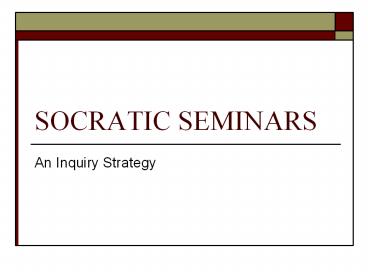SOCRATIC%20SEMINARS - PowerPoint PPT Presentation
Title:
SOCRATIC%20SEMINARS
Description:
SOCRATIC SEMINARS An Inquiry Strategy Socratic Seminar Vision Socrates believed that enabling students to think for themselves was more important than filling their ... – PowerPoint PPT presentation
Number of Views:175
Avg rating:3.0/5.0
Title: SOCRATIC%20SEMINARS
1
SOCRATIC SEMINARS
- An Inquiry Strategy
2
Socratic Seminar Vision
- Socrates believed that enabling students to think
for themselves was more important than filling
their heads with right answers. - Participants seek deeper understanding on complex
ideas through rigorously thoughtful dialogue than
by memorizing bits of information
3
What are Socratic Seminars?
- Highly motivated form of intellectual and
scholarly discourse - Usually range from 30-50 minutes
- An effective Socratic Seminar creates dialogue as
opposed to debate
4
Four Elements
- An effective Socratic Seminar consists of four
interdependent elements - The text(s) being considered
- The questions raised
- The seminar leader, and
- The participants
5
The Text
- The seminar text can be drawn from readings in
literature, history, science, math, health,
philosophy, current events, or from works of art
or music - Texts are usually chosen for their richness in
ideas, issues, values, and their ability to
stimulate extended, thoughtful dialogue.
6
The Question
- An opening questions has no right answer
- It leads participants back to the text as they
speculate, evaluate, define, and clarify the
issues involved - Responses to the opening question generate new
questions - The line of inquiry evolves on the spot
7
The Leader
- Plays a dual role as leader and participant
- Leads thought exploration of the ideas in the
text - Actively engages in the group in the groups
exploration of the text - Helps participants clarify their positions when
arguments happen - Involves reluctant participants w/their more
vocal peers - Must be patient enough to allow participants
understandings to evolve - Must be willing to help participants explore
nontraditional insights and unexpected
interpretation
8
The Participants
- Share responsibility for the quality of the
seminar. - Most effective when participants
- Study the text closely
- Listen actively
- Share ideas and questions in response to others
- Search for evidence in the text to support their
ideas
9
Benefits
- Time to engage in in-depth discussions, problem
solving, and clarification of ideas - Building a strong, collaborative work culture
- Enhanced knowledge and research base
- Increased success for all students
- Teaching respect for diverse ideas, people, and
practices - Creating a positive learning environment for all
students
10
Conducting a 3-4 Person Team
- Strategy to use when you have a LARGE class (over
25 students) - Divide the class into Inner and Outer circles
- Inner Circle active participants/speakers
- Outer Circle- students observe 2-3 active
participants for - New ideas, more questions (what about ?), and
hand notes to their speaker using the text to
further the conversation
11
Tips for the Seminar
- Before the seminar
- Read the text CAREFULLY (provocative questions,
short passages, identify tough vocabulary) - Highlight key facts and details that support key
ideas/concepts raised in the text - Choose some questions in advance (broad,
open-ended, to engage conversation
12
Tips for Teachers
- During the seminar
- Begin with an opening question that has NO right
answer - what is meant by
- what is your own interpretation of the reading?
- Listen HARD, follow each answer with another
question if necessary - Keep students focused (clarification, paraphrase,
insist on standards of rigor, etc.) - Allow for pauses
- Take notes
13
Tips for Teachers
- After the seminar
- Conduct a debriefing
- Have students write a reflection
- Debrief the topic
- Debrief the process
- Assess students
- Assign a grade for performance
- Many prefer to assign a culminating written
assignment or essay
14
Happy Reading!





![❤[PDF]⚡ Early Socratic Dialogues (Penguin Classics) PowerPoint PPT Presentation](https://s3.amazonaws.com/images.powershow.com/10051521.th0.jpg?_=20240610011)

























